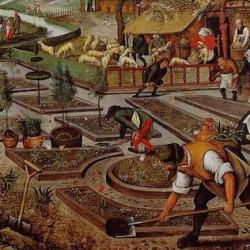Gellner provides a stimulating description of the interconnection of economic, political, cultural, and intellectual components of “industrial society,” which for him is a virtual equivalent of “modern society.” He begins with the Weberian description of modern society as a society organized by principles of “rationality,” by which he means,first, “coherence or consistency, the like treatment of like cases, regularity,” which is manifested both in bureaucratic government and in laboratory sciences, and, second, “efficiency, the cool rational selection of the best available means to given, clearly formulated and isolated ends.” If the bureaucrat is the ideal type of consistency, the entrepreneur is the ideal modern type of efficiency.
Behind these forms of rationality, though, is a deeper impulse, an “ecumenical” outlook that views the world as a single world. While “the most striking fact of pre-modern, pre-rational visions” is “the co-existence within them of multiple, not properly united, but hierarchically arranged sub-worlds,” the striking feature of the modern outlook is its singular unity: “all facts are located within a single continuous logical space” and “statements reporting them can be conjoined and generally related to each other.” In principle, there is “one single language [that] describes the world and is internally unitary.” For moderns, there is a single ruling Logos; and the dividing walls have been broken down.
At the same time, however, modern industrial society insists on “the separation of all separables, the esprit d’analyse .” Though this seems to contradict the unifying spirit of modernity, in fact the two work together.
To achieve the overarching intellectual and social unity of modernity, existing “conceptual package deals” must be analyzed into their components parts. Traditional visions of the world see things in pre-arranged groups and bonds and patterns, and these pre-arranged groupings resist homogenization. If they are going to be ordered rationally, all facts “located within a single continuous logical space,” their prearrangements need to be dissolved. Gellner sees this occurring in theory with a writer like Descartes breaking down the prejudgments of religion and tradition, as well as in political and social life, as, for instance, sub-state units are dissolved into their individual parts and reunified, flatly and homogenously, into modern states systems.
Hume’s theory of causation is a theoretical and philosophical description of this world, not of the world in general. In traditional societies, causes-and-effects were understood as package deals. But Hume argues that “in the very nature of things, nothing is inherently connected with anything else.” “Is the world like that?” Gellner asks, and answers ” Ours is.” This is, obviously, an expression of the esprit d’analyse , and it is also the basis for the notion of progress. Since no pre-existing groupings of people or things are merely accepted, since all are broken down into their component elements, everything is “open to rethinking,” and this is “the pre-condition, the price of a world of endless discovery.”
Thus, the modern dissolution of traditional social groupings, which takes theoretical expression in both Hume and Kant, underwrites an economic and technological outlook. If everything can be rethought, everything is open to new possibilities, and the social expression of this is a society of growth and perpetual progress: “Industrial society is the only society ever to live by and rely on sustained and perpetual growth, on an expected and continuous improvement.” Other societies have enjoyed technical and other improvements, but “the improvement was never perpetual, nor expected to be so. Something special must have happened to have engendered so unusual and remarkable an expectation.”
That special something is the formation of a “conception of the world as homogeneous, subject to systematic, indiscriminate laws, and as open to interminable exploration,” which “offered endless possibilities of new combinations of means with no firm prior expectations and limits: no possibilities would be barred, and in the end nothing but evidence would decide how things are, and how they could be combined to secure desired effects.” The old world was a “cosmos,” purposeful and meaningful and hierarchical, but never entirely unified; today’s world is “morally inert” yet “unitary.”
Gellner circles back to the entrepreneur as the typical man of industrial society: “Home’s account of causation is not merely an admirable summary of the background picture facing the untrammelled, eternal inquirer: it is also an account of the comportment of his economic counterpart, the modern entrepreneur.” Today’s merchant or manufacturer doesn’t rely on “the fusion of labour, technique, material and mould, prescribed by custom, tied to a social order and rhythm” that guided economic actors in traditional societies. Rather, “his progress and the advancement of the economy of which he is a part hinges . . . on untrammelled selection of whatever means, in the light of the evidence and of nothing else, serves some clear aim such as the maixmization of profit.”










